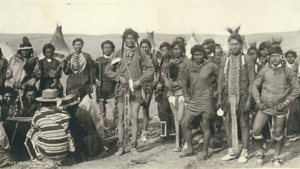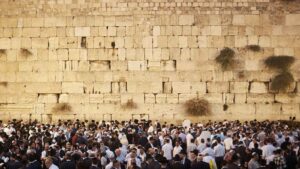Every week the rector from our Episcopal church in Raleigh, NC emails the congregation The Rector’s Weekly EpistleAn epistle, simply, is a letter or message. As many as twenty-one of the twenty-seven books of the New Testament are epistles, letters written to churches or persons for instruction, pastoral care, or discipline. More. We may hear bits and pieces of his musings again from the pulpit the following Sunday, but mainly his missives are reflections about everyday life and our Christian response. Besides, it’s a great way to connect church members with some sort of theological inspiration to help us all become more centered during the week.
I must confess, however, that I don’t always read his weekly email epistles. Because the machinations of daily life get the better of me, those letters frequently get lost in the onslaught of other emails about doctor appointment reminders, numerous Substack subscriptions, personal correspondences, and of course a slew of annoying junk mail. With a scattered attention span and an endless to-do list, I often don’t give myself time to sit, read, and reflect.
However, this week’s epistle caused me to pause.
All seasoned authors know the importance of a hook to draw the reader into the story, so when this week’s letter began with “I don’t preach politics, I preach religion,” I sat up and took notice. Our national climate is feverish from partisan politics dividing our country literally in half, and because the Church, in general, shies away from any formal political partisanship or identity, this letter got me thinking about our current political state and how it relates to the life and religious teachings of JesusJesus is the Messiah whose life, death, and resurrection are God's saving act for humanity. More.
Let’s face it. As a Jew who lived on this earth thousands of years ago, Jesus had full knowledge of the Law (both religious and secular) and the customs expected of him. Jesus knew how to use money to pay for goods, he understood the local tax system, and he also knew the TorahThe Torah is the law of Moses, also known as the first five books of the Bible. To many the Torah is a combination of history, theology, and a legal or ritual guide. More forbade him from working on the sabbathSabbath is a weekly day of rest, the seventh day, observed on Saturday in Judaism and on Sunday in Christianity. In the book of Genesis, God rested on the seventh day; in the Gospel accounts Jesus and his disciples are criticized by some for not... More. As a rabbi, Jesus traveled in and out of the political world intentionally when he fraternized with elected officials, tax collectors, the Pharisees, and Sadducees. He lived with and among all of the people.
What better way to understand the life and times of Jesus than by looking in the New Testament Gospels, and in particular, the Gospel of MatthewA tax collector who became one of Jesus' 12 disciples. More. Why Matthew, you ask? Two major themes come to light in this Gospel: Jesus’ kingship (“King of the Jews”) and the kingdom of heaven. For example, Matthew introduces most of Jesus’ parables with the phrase “The kingdom of heaven is like … ” And nothing speaks of political influence better than the image of a king, seated high on his throne, governing all the nations within his vast kingdom.
But why does Matthew emphasize these themes? Most scholars believe Matthew was written for a Jewish audience. When studied as a whole, the Gospel of Matthew features elements that intentionally connect Jesus to the Jewish Messianic prophecies of the Old Testament. The author of Matthew does this when he:
- Cites the Hebrew Scriptures more than any of the other Gospel authors;
- References Old Testament quotations and characters often;
- Portrays Jesus as the new MosesProphet who led Israel out of Egypt to the Promised Land and received the law at Sinai. More and his teachings as the new Torah; and
- Identifies Jesus as the “Son of DavidSecond king of Israel, David united the northern and southern kingdoms. More,” thus emphasizing his Jewish lineage with royal overtones.
Furthermore, the structure of Matthew also supports the notion of Jesus’ kingship. The book contains five major speeches: the Sermon on the Mount/Kingdom Ethics (Matthew 5-7), the Commissioning of the Twelve/the Mission of the Kingdom (Matthew 10), the Parables of the Kingdom (Matthew 13), Community Instructions/Kingdom Governance (Matthew 18), and the Olivet Discourse/the Future of the Kingdom (Matthew 24-25).
While I am no Biblical scholar, if someone were to ask me “where in Scripture is Jesus political?” two stories would immediately come to mind. My favorite story is when Jesus flips the tables of the money changers in the templeThe Jerusalem temple, unlike the tabernacle, was a permanent structure, although (like the tabernacle) it was a place of worship and religious activity. On one occasion Jesus felt such activity was unacceptable and, as reported in all four Gospels, drove from the temple those engaged... More (Matthew 21:12-13). The New International Version says he “drove out” anyone participating in monetizing sacred church activities and turning his house of prayer into “a den of robbers.” I like this story, not because it shows the violent acts of overturning tables filled with wares, but because we see a side of Jesus that is fully human—he displays anger and passion—to which we can all relate.
The second passage that comes to mind is when the Pharisees try to trap Jesus about paying imperial taxes (Matthew 22:15-22). They ask Jesus, because he is set apart and “not swayed by others,” (Matthew 22:16), if he is obligated to pay the tax to Caesar’s government or not. After bringing him a denarius coin, Jesus has them identify whose face is imprinted on the coin, instructing them to “give back to Caesar what is Caesar’s” (Matthew 22:21). The story isn’t just about instructing his followers to obey the laws of the land, but more importantly, “to give back to God what is God’s” (Matthew 22:21). Do your duty as a citizen of the Roman EmpireThe region we today call Palestine and Israel was under Roman rule during the time of Jesus and the early church. The Roman Empire was in its ascendancy during the first century, making it the most powerful political and military force on earth. More, but more importantly, obey God by loving God and your neighbor.Perhaps religion and politics aren’t mutually exclusive especially when we see the life of Jesus as portrayed in the Gospel of Matthew. The Gospels give us modern readers a window into the life of Jesus—complete with his words and his actions—as a guide for how to live our own lives. We know Jesus was humble, full of mercyMercy is a term used to describe leniency or compassion. God's mercy is frequently referred to or invoked in both the Old and New Testaments. More and compassion, and yet, he was King of the Jews. We can proclaim his goodness and his lordship. We feel his love for us and his call for justice. Perhaps the whole message of Matthew is to show us how our faith should inform our politics.






